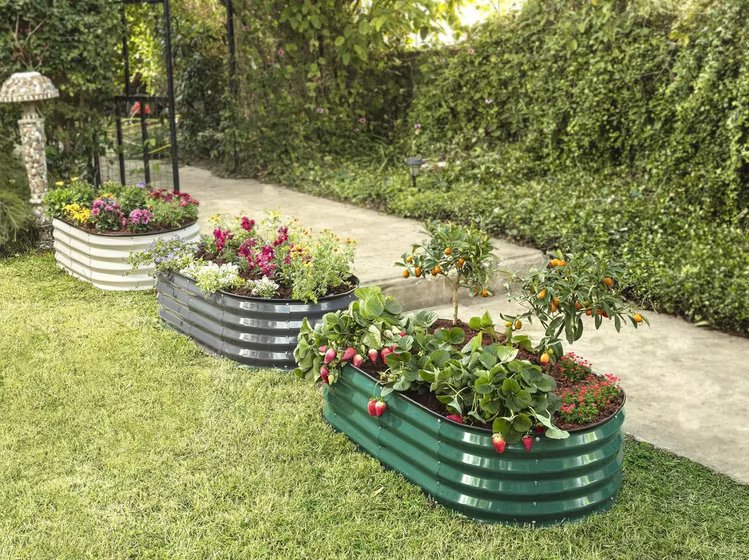Expert Tips for Maintaining Metal Garden Beds and Extending Their Lifespan
Maintaining metal garden beds is essential to ensure their longevity, functionality, and aesthetic appeal. Whether you’re growing vegetables, flowers, or herbs, metal garden beds offer a durable and stylish solution for your garden. However, like any outdoor structure, they require proper care to keep them in excellent condition.

Maintaining metal garden beds is essential to ensure their longevity, functionality, and aesthetic appeal. Whether you’re growing vegetables, flowers, or herbs, metal garden beds offer a durable and stylish solution for your garden. However, like any outdoor structure, they require proper care to keep them in excellent condition. In this article, we’ll share expert tips on how to maintain your metal garden beds and extend their lifespan, so you can enjoy a thriving garden for years to come.
Why Metal Garden Beds Are a Smart Investment
Metal garden beds have become increasingly popular due to their durability and low-maintenance requirements. Unlike traditional wooden beds, metal beds are resistant to rotting, pests, and extreme weather conditions, making them ideal for long-term use. However, without proper care, even the toughest metal beds can suffer from rust, wear, and tear. Here are some essential maintenance tips to help you get the most out of your metal garden beds.
1. Choose the Right Material
When investing in metal garden beds, it’s important to choose the right type of metal. Galvanized steel is one of the best options for metal garden beds because it resists rust and corrosion. It’s coated with a layer of zinc, which helps protect the metal from the elements. Another option is corten steel, which naturally develops a rust-like patina over time and adds a unique, rustic look to your garden. By selecting high-quality materials, you’ll minimize the need for frequent maintenance.
2. Use Protective Coatings to Prevent Rust
Even though galvanized steel and corten steel are resistant to rust, they can still develop corrosion over time if not properly maintained. One of the best ways to protect your metal garden beds is by applying a protective coating. Use a high-quality, rust-resistant paint or a clear sealant to create a barrier between the metal and the moisture. Reapply the coating every couple of years to keep your metal beds in prime condition.
3. Inspect for Damage Regularly
Routine inspections are key to preventing small issues from becoming big problems. Check your metal garden beds at least once a year for signs of rust, dents, or any areas that may need touch-ups. If you spot any rust spots, treat them immediately with a rust remover or sandpaper to prevent further corrosion. If your metal bed is dented, it’s crucial to straighten it out to maintain its structural integrity.
4. Elevate the Base of Your Metal Garden Beds
To avoid direct contact with the ground, which can accelerate rusting, consider elevating your metal garden beds. Use bricks, pavers, or wooden blocks to lift the bottom of the bed off the soil. This will help prevent moisture buildup underneath, which is a common cause of rust. Additionally, elevating the base promotes better drainage, ensuring that your plants have the best growing environment possible.
Proper Maintenance Practices to Extend the Life of Your Metal Garden Beds
While protecting your metal garden beds from corrosion is essential, ongoing maintenance practices will ensure their longevity and functionality. Here are a few additional tips:
1. Clean Your Metal Garden Beds Regularly
Debris, dirt, and organic matter can accumulate on the surface of your metal beds, potentially causing damage over time. Regularly clean your metal garden beds using a hose and a soft brush to remove dirt and grime. For stubborn stains, use mild soap and water, but avoid harsh chemicals that could damage the metal or your plants.
2. Avoid Overwatering
Overwatering your plants can lead to excess moisture around the base of your metal beds, which can encourage rust. Make sure your metal garden beds have proper drainage, and water your plants only when necessary. This will help reduce moisture exposure and extend the life of your metal garden beds.
3. Protect the Metal from Extreme Weather Conditions
Extreme heat, cold, and heavy rain can take a toll on your metal garden beds over time. During the colder months, consider covering your metal beds with a tarp or breathable fabric to protect them from snow and ice. If you live in an area with harsh weather conditions, you may also want to invest in metal beds that are designed to withstand extreme temperatures.
Conclusion
By following these expert tips, you can keep your metal garden beds in excellent condition for years to come. From selecting the right materials to performing regular maintenance checks, these simple steps will help you protect your investment and create a thriving, beautiful garden. Remember, a little care goes a long way when it comes to extending the lifespan of your metal garden beds, allowing you to enjoy all the benefits they offer for many seasons ahead. Happy gardening!
What's Your Reaction?
















.jpg)